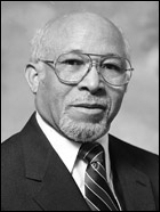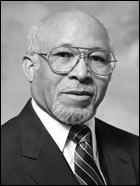
Charlie Brady Hauser
Encyclopedia

Winston-Salem State University
Winston-Salem State University , a constituent institution of the University of North Carolina, is a historically black public research university located in Winston-Salem, North Carolina, United States. It is a member school of the Thurgood Marshall Scholarship Fund.Winston-Salem State has been...
in North Carolina
North Carolina
North Carolina is a state located in the southeastern United States. The state borders South Carolina and Georgia to the south, Tennessee to the west and Virginia to the north. North Carolina contains 100 counties. Its capital is Raleigh, and its largest city is Charlotte...
for 21 years, and served two terms in the North Carolina General Assembly
North Carolina General Assembly
The North Carolina General Assembly is the state legislature of the U.S. state of North Carolina. The General Assembly drafts and legislates the state laws of North Carolina, also known as the General Statutes...
. He had also previously taught Education at West Virginia State College. Dr. Hauser described himself as the "second strike" against segregated travel in America
United States
The United States of America is a federal constitutional republic comprising fifty states and a federal district...
for refusing to move to the back of a bus
Bus
A bus is a road vehicle designed to carry passengers. Buses can have a capacity as high as 300 passengers. The most common type of bus is the single-decker bus, with larger loads carried by double-decker buses and articulated buses, and smaller loads carried by midibuses and minibuses; coaches are...
, the "first strike" being credited to Irene Morgan Kirkaldy, a black woman whose refusal to give up her bus seat to white passengers in 1944 led to a landmark United States Supreme Court decision more than 10 years before Rosa Parks
Rosa Parks
Rosa Louise McCauley Parks was an African-American civil rights activist, whom the U.S. Congress called "the first lady of civil rights", and "the mother of the freedom movement"....
.
"C.B." Hauser was born on a farm in the small southern town of Yadkinville, North Carolina
Yadkinville, North Carolina
Yadkinville is a town in Yadkin County, North Carolina, United States. The population was 2,818 at the 2000 census. Located in the Piedmont Triad, it is the county seat and largest city of Yadkin County.-Geography:Yadkinville is located at ....
, the third oldest of thirteen siblings. He believed that he learned leadership skills while growing up on the farm because, as third oldest child, he had to help take care of his many younger siblings, while at the same time doing his chores and getting whatever education he could in what he called "this 'no stop sign' small segregated southern town." He said, "All that personal history gave me a fortitude, which I drew on that day in 1947 on that Greyhound bus going to West Virginia." He later said that he did not sit on the back seat of the bus that October day because he knew the Supreme Court had ruled that interstate passengers were not subject to state Jim Crow laws. He felt that as an educated U.S. citizen who had served his country in time of war, having spent 44 months fighting overseas, he was determined to exercise his right as a citizen. He had served with the U.S. Army 582-641st Ordinance and Munitions Division. Promoted to Staff Sergeant
Staff Sergeant
Staff sergeant is a rank of non-commissioned officer used in several countries.The origin of the name is that they were part of the staff of a British army regiment and paid at that level rather than as a member of a battalion or company.-Australia:...
, his exemplary service was recognized with a Good Conduct Medal
Good Conduct Medal
The Good Conduct Medal is one of the oldest military awards of the United States military. The Navy Good Conduct Medal was first issued in 1869, followed by a Marine version in 1896. The Coast Guard Good Conduct Medal was issued in 1923 and the Army Good Conduct Medal in 1941. The Air Force was...
, an ETO Ribbon, and Five Battle Stars
Service star
A service star, also referred to as a battle star, campaign star, or engagement star, is an attachment to a United States military decoration which denotes participation in military campaigns or multiple bestowals of the same award. Service stars are typically issued for campaign medals, service...
. As a veteran, he took full advantage of the GI Bill, earning his Masters Degree and a Doctorate
Doctorate
A doctorate is an academic degree or professional degree that in most countries refers to a class of degrees which qualify the holder to teach in a specific field, A doctorate is an academic degree or professional degree that in most countries refers to a class of degrees which qualify the holder...
in Education from the University of Pennsylvania
University of Pennsylvania
The University of Pennsylvania is a private, Ivy League university located in Philadelphia, Pennsylvania, United States. Penn is the fourth-oldest institution of higher education in the United States,Penn is the fourth-oldest using the founding dates claimed by each institution...
. He also attended Catholic University
The Catholic University of America
The Catholic University of America is a private university located in Washington, D.C. in the United States. It is a pontifical university of the Catholic Church in the United States and the only institution of higher education founded by the U.S. Catholic bishops...
and Texas Southern University
Texas Southern University
Texas Southern University is a historically black university located in Houston, Texas, United States....
, becoming a member of the Omega Psi Phi
Omega Psi Phi
Omega Psi Phi is a fraternity and is the first African-American national fraternal organization to be founded at a historically black college. Omega Psi Phi was founded on November 17, 1911, at Howard University in Washington, D.C.. The founders were three Howard University juniors, Edgar Amos...
fraternity. He enlisted in the Army with the ambition of becoming a Commissioned Officer or a Warrant Officer
Warrant Officer
A warrant officer is an officer in a military organization who is designated an officer by a warrant, as distinguished from a commissioned officer who is designated an officer by a commission, or from non-commissioned officer who is designated an officer by virtue of seniority.The rank was first...
, but was ultimately denied a commission despite fulfilling all mental and physical exams. This he attributed to racial discrimination.
For his refusal to move to the back of a Greyhound bus while traveling from Winston-Salem to his teaching job at West Virginia State College, Hauser was arrested and jailed. He recalled that as talk of lynching
Lynching
Lynching is an extrajudicial execution carried out by a mob, often by hanging, but also by burning at the stake or shooting, in order to punish an alleged transgressor, or to intimidate, control, or otherwise manipulate a population of people. It is related to other means of social control that...
and mob violence swirled around him, he remained composed and unafraid. At one point he even heard someone shout "Get the rope!" In recalling this years later he said, "Like in the war as the bombs exploded and the possibility of death filled the air, I just concentrated on what I needed to focus on to survive." He was, as President
President
A president is a leader of an organization, company, trade union, university, or country.Etymologically, a president is one who presides, who sits in leadership...
John F. Kennedy
John F. Kennedy
John Fitzgerald "Jack" Kennedy , often referred to by his initials JFK, was the 35th President of the United States, serving from 1961 until his assassination in 1963....
famously said of their generation, "Tempered by war." Interestingly, he and President Kennedy shared the same birth year.
Upon his release on bail, he set about planning his legal response. During the months that followed, prior to his day in court, he considered filing a lawsuit for false arrest. He also felt that his case might provide a test of the constitutionality of North Carolina segregation laws.
The judge ruled that his arrest was unconstitutional, stating that he had the right to sit wherever he pleased. The Judge further stated that, having sworn to uphold the United States Constitution, he was obliged to throw the case out of court. The Atlantic Greyhound Lines
Atlantic Greyhound Lines
The Atlantic Greyhound Lines , a highway-coach carrier, was a Greyhound regional operating company, based in Charleston, West Virginia, USA, from 1931 until 1960, when it became merged with the Southeastern Greyhound Lines , a neighboring operating company, thus forming the Southern Division of The...
was ordered to pay a judgment of $2,000. With the money Dr.Hauser bought a car, elated that he "didn’t have to take the bus again!"
In taking such decisive action, Dr. Hauser followed the path of yet another courageous champion of human rights in America. A full century before Rosa Parks' famous stand, and 90 years before that of Irene Morgan Kirkaldy, 24 year old Elizabeth Jennings Graham
Elizabeth Jennings Graham
Elizabeth Jennings Graham was a black woman who lived in New York City. She figured in an important early civil rights case, when she insisted on her right to ride on a streetcar in 1854.-Early life:...
, a schoolteacher, was physically ejected from a horse drawn omnibus
Bus
A bus is a road vehicle designed to carry passengers. Buses can have a capacity as high as 300 passengers. The most common type of bus is the single-decker bus, with larger loads carried by double-decker buses and articulated buses, and smaller loads carried by midibuses and minibuses; coaches are...
on the streets of New York City
New York City
New York is the most populous city in the United States and the center of the New York Metropolitan Area, one of the most populous metropolitan areas in the world. New York exerts a significant impact upon global commerce, finance, media, art, fashion, research, technology, education, and...
because she was a woman of color. She too took her case to court, emerging victorious in standing up for social justice and the democratic principles upon which this nation was founded.
Although a lifetime member of the N.A.A.C.P., Dr. Hauser resisted requests to take a more active role in the Civil Rights Movement
Civil rights movement
The civil rights movement was a worldwide political movement for equality before the law occurring between approximately 1950 and 1980. In many situations it took the form of campaigns of civil resistance aimed at achieving change by nonviolent forms of resistance. In some situations it was...
, preferring to contribute to the effort in his own way. He retired from teaching in 1977, going on to serve two terms in the North Carolina General Assembly in the early 1980s. A decorated war veteran, he died on Veterans Day at age 90.
Quote
In speaking of his role in the legal battle for equal treatment in public transportation, Dr. Hauser said:"Everybody’s heard the expression "three strikes you’re out!" Well, that’s what it came down to when Rosa Parks refused to give up her seat to a white passenger on that Alabama day in [1955]. The laws were in place. The masses were ready for a change. The leadership had been developed. And the time had finally come."
"...Irene Morgan was the first strike against the Jim Crow laws with her 1944 Virginia court challenge. There was no fanfare, just her fierce determination."

